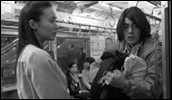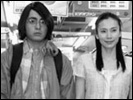Train Man
- Year
- 2005
- Original title
- Densha Otoko
- Japanese title
- 電車男
- Director
- Cast
- Running time
- 105 minutes
- Published
- 22 November 2005



by Adam Campbell
Like it or not, 'True Love' and earnestly whimsical films are here to stay for the next few years. Rather than cynical detachment, we have faced a number of media ventures which present honest to goodness stories dealing with honest to goodness people. With the love story, this found its apex with the almost mind-melting Winter Sonata, a Korean soap opera which found a fanatical fan base when broadcast on Japanese domestic television. Many Japanese cinephiles would probably prefer to point to more engaging examples prior to the Korean invasion as planting the seeds for this revival, such as Shunji Iwai's Love Letter. On the literary side, there have been hits like the novel Calmi Cuori Appassionati, which found an audience among high school girls, and the less popular film adaptation. However, few pieces hit home with the same level of penetration as Winter Sonata, an incredible success for a foreign project, particularly among the housewives of Japan. Guess who also form one of the country's largest cinema-going audiences?
Over the past couple of years, a rush of these stories have hit the television and cinema screens. They range from the popular, such as the unfortunately titled Tokyo Wankei, to the super popular, such as Crying Out Love, in the Center of the World (Sekai no Chushin de, Ai o Sakebu). When talking about Train Man, two movies are almost intrinsically linked. One is Crying Out Love, the other My Sassy Girl. First of all, to the credit of Train Man, it wears its intentions on its sleeve. As soon as the Toho logo fades, the first words which appear on the screen are "A True Love Story". Yes, don't worry. This is a True Love story. It's worth mentioning these words appear in English, perhaps to appeal to the glossy magazine crowd who might be impressed. The fact that we know this is a True Love story before we know who is in it or what it is called speaks volumes. If those words alone are enough to ensure your entrance into the film, you are most likely the desired audience for Train Man.
It is unfair though to imagine that only people with a bias to a certain sub-genre might appear at this cinema or rent this DVD. Actually Train Man has a long and varied history, almost more interesting than the tale itself. Starting out originally as a presumably genuine post on the popular Japanese internet forum "2chan", the real events were then made into a book, a manga series, a movie, and a television series. Crying Out Love also straddled the boundaries of book, television, and movie within the same year. Just in case anyone was in the dark, the lead actor from Train Man, Takayuki Yamada, played a very large part in the Crying Out Love television show. It's hard to believe this is a happy accident.
Perhaps the greatest criticism that can be levelled against the feature versions of Crying Out Love and Train Man is that they do not match up to their accompanying television adaptations. Not in terms of inescapable factors such as length, but in terms of approach. As a narrative, Train Man is extremely simple and excellently summed up in a short animation which plays over the ending credits. This is the story of a shy geeky young man who gets a sudden surge of confidence and defends a beautiful woman on a train when she is assaulted by a drunken passenger (Ren Osugi, getting some cash to redecorate his kitchen, one might assume). From here, the inevitable romance blossoms. The geek receives a gift from the girl and turns to the 2chan forum, using the alias Densha Otoko / Train Man, for advice on how he should handle the dating situation. An assorted rogues gallery of internet posters then give him pointers on his love life. Basically this is the classic 'sidekick' romantic comedy character digitised for the modern age and multiplied. Almost all of their characters are defined by using the internet as an ironic mirror. If you enjoy such drawn-out ironies as a hikikomori character who advises someone to go outside, or a couple on the rocks who rediscover their love by advising someone else how to start a relationship, then you will get all of those and more. It would be nice to say the film is at least an inoffensive way to pass time, but this is unfortunately not the case.
In the television show, which hit home screens right after the film's release, the main Densha Otoko character was supported by some real-life friends, fellow geeks who were infatuated with a cartoon character. In the film, Densha is all alone and any real-life friends are never seen. Similarly his family which feature in the television version do not appear in the film, although their presence is hinted at in a single scene, where a package which arrived for Densha has been placed on his bed by unseen 'others' living in his house. Represented as he is in the film as isolated, the character who has most in common with Densha becomes the hikikomori who speaks to him via the internet forum. This essentially moves the main character from the realms of eccentric to psychologically disordered, from different to flawed. While it may seem a small point, the removal of Densha's social life changes the moral of the story and balance of the relationship.
As with the remake of Alfie starring Jude Law, Train Man frequently features relevant messages to the audience imposed on the screen, on billboards, and on lampposts. Also like that film, Train Man is not about resurgent masculinity (despite the story beginning with an emasculated man rising up to tackle a train-bound menace) but rather is really concerned with female dominance. When you are broken down to your lowest level then you should be so lucky as to be accepted by a beautiful woman, this is the implication of the events on display. As with most 'makeover' films, it should come as no surprise to learn there is a scene in which Densha must strip off his stylish threads and let his flame see him as he truly is. That it happens in an almost unbelievably contrived visual metaphor is neither here nor there. What is worth noting is that in the very next scene, Densha is back in his designer gear, wearing his contact lenses! "I love you just the way you are," the film says. "Now get back into that Gucci jacket so I can take you outside." In a more savvy motion picture, these contradictions would be clever. Unfocused as they are here, they seem less an attempt to subvert the genre and more a genuine play to the target audience, young women of a superficial disposition.
The Korean hit My Sassy Girl followed a similar creative past, being at once an internet thread, comic book, novel and film. It also took a great leap forward by moving a little backward, taking some influence from classic Hollywood films like His Girl Friday, Bringing Up Baby, and The Philadelphia Story, and giving them a strictly modern update. Korean culture may be the fad du jour in Japan now, but a light comparison of these two films, about disparate couples who meet in an undesirable train incident, show just how far about the mainstream sensibilities can be. In My Sassy Girl the girl in question is rude, violent, unpredictable, and a heavy drinker. With a snappy script and a talented actress, she comes across more desirably sassy than ploddingly tiresome, making the relationship in that film believable. Miki Nakatani plays the inscrutable angel of Densha Otoko who, with her blowing hot and cold and polished veneer, makes you wish by the end of the picture Densha would just go home and play with his Palm Pilot. Showing the entire film from his point of view could have been a wonderful chance to explore the feminine mystique, but this film is rarely about anything more than a geek getting lucky.
At several points throughout production, this film has taken a misstep. For such a shallow narrative, it is much too plain and serious. Takayuki Yamada is also too handsome in the first place for his dapper transformation to mean very much to the audience. Coincidently, after this makeover, Densha most closely resembles a male 'host' from a Japanese groping club. Since the same and similar material has been covered so much better elsewhere, with greater interest, sensitivity, and wit, it seems difficult to recommend this film. Therefore, be warned. Fans of the book or show may well be disappointed and casual audiences could well be repulsed. One thing I will say, that is quite an accomplishment for a dull romantic comedy.